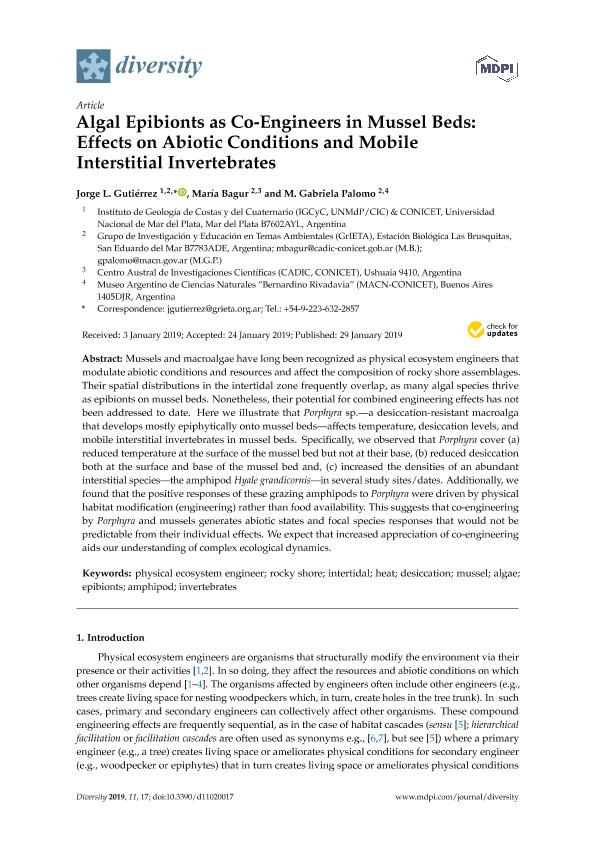Artículo
Algal epibionts as co-engineers in mussel beds: Effects on abiotic conditions and mobile interstitial invertebrates
Fecha de publicación:
02/2019
Editorial:
MDPI AG
Revista:
Diversity
ISSN:
1424-2818
Idioma:
Inglés
Tipo de recurso:
Artículo publicado
Clasificación temática:
Resumen
Mussels and macroalgae have long been recognized as physical ecosystem engineers that modulate abiotic conditions and resources and affect the composition of rocky shore assemblages. Their spatial distributions in the intertidal zone frequently overlap, as many algal species thrive as epibionts on mussel beds. Nonetheless, their potential for combined engineering effects has not been addressed to date. Here we illustrate that Porphyra sp.-a desiccation-resistant macroalga that develops mostly epiphytically onto mussel beds-affects temperature, desiccation levels, and mobile interstitial invertebrates in mussel beds. Specifically, we observed that Porphyra cover (a) reduced temperature at the surface of the mussel bed but not at their base, (b) reduced desiccation both at the surface and base of the mussel bed and, (c) increased the densities of an abundant interstitial species-the amphipod Hyale grandicornis-in several study sites/dates. Additionally, we found that the positive responses of these grazing amphipods to Porphyra were driven by physical habitat modification (engineering) rather than food availability. This suggests that co-engineering by Porphyra and mussels generates abiotic states and focal species responses that would not be predictable from their individual effects. We expect that increased appreciation of co-engineering aids our understanding of complex ecological dynamics.
Archivos asociados
Licencia
Identificadores
Colecciones
Articulos(CADIC)
Articulos de CENTRO AUSTRAL DE INVESTIGACIONES CIENTIFICAS
Articulos de CENTRO AUSTRAL DE INVESTIGACIONES CIENTIFICAS
Articulos(CCT - MAR DEL PLATA)
Articulos de CTRO.CIENTIFICO TECNOL.CONICET - MAR DEL PLATA
Articulos de CTRO.CIENTIFICO TECNOL.CONICET - MAR DEL PLATA
Articulos(MACNBR)
Articulos de MUSEO ARG.DE CS.NAT "BERNARDINO RIVADAVIA"
Articulos de MUSEO ARG.DE CS.NAT "BERNARDINO RIVADAVIA"
Citación
Gutierrez, Jorge Luis Ceferino; Bagur, María; Palomo, Maria Gabriela; Algal epibionts as co-engineers in mussel beds: Effects on abiotic conditions and mobile interstitial invertebrates; MDPI AG; Diversity; 11; 2; 2-2019; 1-19
Compartir
Altmétricas




